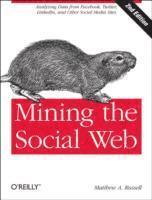
- Format
- Häftad (Paperback)
- Språk
- Engelska
- Antal sidor
- 448
- Utgivningsdatum
- 2013-10-15
- Upplaga
- 2 Rev ed
- Förlag
- O'REILLY & ASSOCIATES
- Illustrationer
- black & white illustrations
- Dimensioner
- 230 x 180 x 30 mm
- Vikt
- Antal komponenter
- 1
- ISBN
- 9781449367619
- 736 g
Mining the Social Web: Data Mining Facebook, Twitter, LinkedIn, Google+, GitHub, and More
Data Mining from Facebook, Twitter, and Linkedin With Python
Slutsåld
Kundrecensioner
Fler böcker av Matthew A Russell
-
Dojo: The Definitive Guide: The Definitive Guide
Matthew A Russell
-
PayPal APIs: Up and Running
Matthew A Russell
-
Mining the Social Web
Matthew A Russell, Mikhail Klassen
-
Dojo: The Definitive Guide
Matthew A Russell
Recensioner i media
Mining the social web, again When we first published "Mining the Social Web," I thought it was one of the most important books I worked on that year. Now that we're publishing a second edition (which I didn't work on), I find that I agree with myself. With this new edition, "Mining the Social Web" is more important than ever. While we're seeing more and more cynicism about the value of data, and particularly "big data," that cynicism isn't shared by most people who actually work with data. Data has undoubtedly been overhyped and oversold, but the best way to arm yourself against the hype machine is to start working with data yourself, to find out what you can and can't learn. And there's no shortage of data around. Everything we do leaves a cloud of data behind it: Twitter, Facebook, Google+ -- to say nothing of the thousands of other social sites out there, such as Pinterest, Yelp, Foursquare, you name it. Google is doing a great job of mining your data for value. Why shouldn't you? There are few better ways to learn about mining social data than by starting with Twitter; Twitter is really a ready-made laboratory for the new data scientist. And this book is without a doubt the best and most thorough approach to mining Twitter data out there. But that's only a starting point. We hear a lot in the press about sentiment analysis and mining unstructured text data; this book shows you how to do it. If you need to mine the data in web pages or email archives, this book shows you how. And if you want to understand how to people collaborate on projects, "Mining the Social Web" is the only place I've seen that analyzes GitHub data. All of the examples in the book are available on Github. In addition to the example code, which is bundled into IPython notebooks, Matthew has provided a VirtualBox VM that installs Python, all the libraries you need to run the examples, the examples themselves, and an IPython server. Checking out the examples isa
Övrig information
Matthew Russell, Chief Technology Officer at Digital Reasoning Systems (http://www.digitalreasoning.com/) and Principal at Zaffra (http://zaffra.com), is a computer scientist who is passionate about data mining, open source, and web application technologies. He's also the author of Dojo: The Definitive Guide (O'Reilly)
